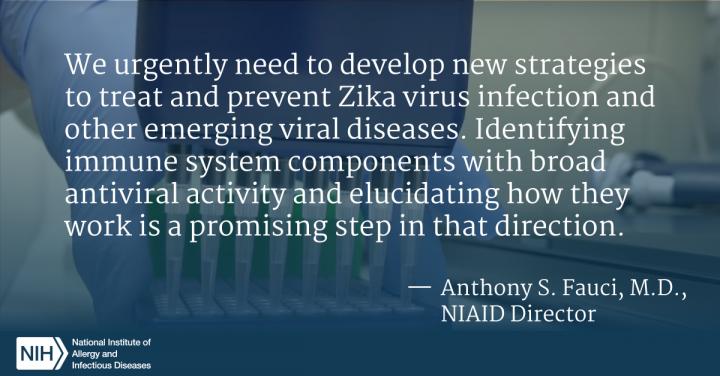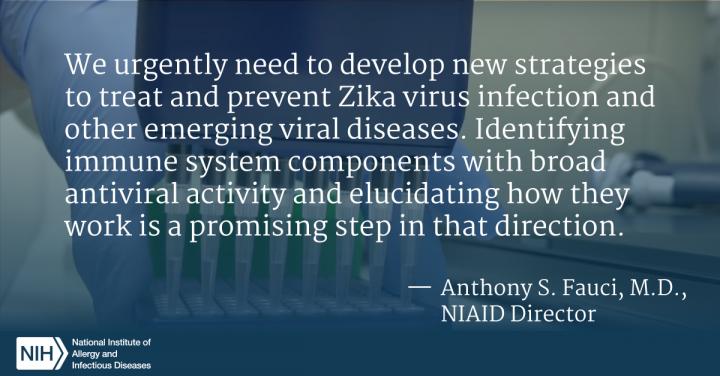
Credit: Dr. Anthony S. Fauci, NIAID
A molecule naturally produced by the immune system protects mice and monkeys against Zika virus infection, an international team of researchers has found. Administering the molecule, called 25-hydroxycholesterol or 25HC, to pregnant mice reduced Zika virus infection in the fetal brain and protected against Zika-induced microcephaly. The work was supported in part by the National Institute of Allergy and Infectious Diseases (NIAID), a component of the National Institutes of Health.
Previous experiments suggested that 25HC has broad antiviral activity. In the new study, researchers led by Genhong Cheng, Ph.D., of the University of California, Los Angeles, investigated whether 25HC has a protective effect against Zika virus, for which there is no licensed antiviral drug or vaccine. Their initial cell culture experiments indicated that 25HC can block Zika and related viruses, including dengue and yellow fever viruses, from entering cells.
The researchers next established that 25HC is protective in mouse and monkey models of Zika virus infection. For example, mice given 25HC before being infected with Zika virus had significantly lower blood levels of the virus than mice given a placebo. 25HC-treated mice were more likely to survive Zika infection, and the surviving mice had no clinical symptoms. Monkeys given 25HC also had reduced levels of Zika virus in blood and urine and did not develop a fever in response to infection.
To determine whether 25HC could protect against Zika-induced microcephaly, the researchers gave pregnant mice 25HC or placebo before and for five days after their embryos were infected with Zika virus. Treatment with 25HC significantly decreased levels of Zika virus in fetal mouse brain tissue and greatly reduced the occurrence and severity of developmental defects, including small fetal brain size. The researchers did not observe any adverse effects on pregnancy or birth related to 25HC treatment.
The authors conclude that 25HC shows promise as a natural agent that can combat a broad array of viruses, including Zika virus. Additional preclinical research is needed before investigating whether 25HC can safely protect humans against Zika virus infection and associated birth defects.
###
ARTICLE: C Li, YQ Deng, S Wang, F Ma et al. 25-Hydroxycholesterol protects host against Zika virus infection and its associated microcephaly in mouse model. Immunity DOI: 10.1016/j.immuni.2017.02.012 (2017).
WHO: NIAID Director Anthony S. Fauci, M.D., and Wolfgang Leitner, Ph.D., chief of the Innate Immunity Section in NIAID's Division of Allergy, Immunology and Transplantation, are available to comment on the findings.
CONTACT: To schedule interviews, please contact Hillary Hoffman, (301) 402-1663, [email protected]
NIAID conducts and supports research–at NIH, throughout the United States, and worldwide–to study the causes of infectious and immune-mediated diseases, and to develop better means of preventing, diagnosing and treating these illnesses. News releases, fact sheets and other NIAID-related materials are available on the NIAID website.
About the National Institutes of Health (NIH): NIH, the nation's medical research agency, includes 27 Institutes and Centers and is a component of the U.S. Department of Health and Human Services. NIH is the primary federal agency conducting and supporting basic, clinical, and translational medical research, and is investigating the causes, treatments, and cures for both common and rare diseases. For more information about NIH and its programs, visit http://www.nih.gov.
NIH…Turning Discovery Into Health®
Media Contact
Hillary Hoffman
[email protected]
301-402-1663
@NIAIDNews
http://www.niaid.nih.gov





